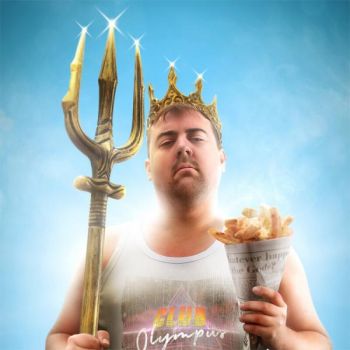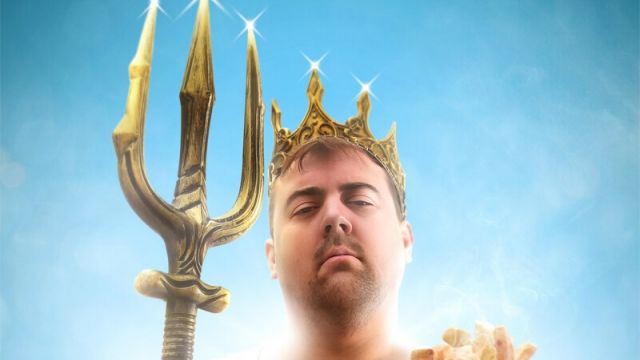Grandpa Poseidon
Before the show properly starts, storyteller and songsmith Phil Grainger is handing out post-it notes, asking the audience sitting in the round to come up with the names of things you’d pack in your car to go on holiday. Suggestions of sunscreen and snacks are noted, a bucket and spade for the beach – and Grainger introduces us to some other important items. The story is set in the 1990s, so it’s an old Walkman with orange foam headphones and a VHS video tape that contains our entertainment once we get to the holiday house.
Alex Wright & Phil Grainger are Fringe-royalty, creating multi-award winning shows everywhere they go, entertaining, educating, and through their brilliant storytelling through words spoken and sung, they evoke emotional – even spiritual – responses from audiences around the world. Through small performances of shows like Orpheus and Helios (both being performed in this Fringe), they reframe Greek mythology in contemporary settings. Whilst drawing on their Yorkshire roots, their storytelling sketches the lines enough for the audience to colour between them, regardless of the listener’s own culture and background. Even here, a rainy English seaside town in October, is relatable and it’s easy to find that picture in our minds.
This story concerns Poseidon – the God of the sea, storms, earthquakes – and horses. He had a tumultuous life, had huge influences and involvement in much of Greek mythology, and fathered an inordinate amount of children (some of which weren’t entirely human). Except here he’s not a God anymore. As if this is a sequel from Wright & Grainger’s epic The Gods, The Gods, The Gods, where the old Gods retire, Poseidon is an old man with long grey hair and a beard, who swims in the sea and eats fish and chips for dinner.
 Though it’s not just about the ex-God. It’s also about a ten-year-old child, Lo, who is on holiday with a parent. It’s bittersweet because there’s just the two of them, and it’s raining, but at least they’re by the sea, and there’s chips. Lo first sees Poseidon waving his arms around the gulls on the beach, but meets him properly in the bus stop.
Though it’s not just about the ex-God. It’s also about a ten-year-old child, Lo, who is on holiday with a parent. It’s bittersweet because there’s just the two of them, and it’s raining, but at least they’re by the sea, and there’s chips. Lo first sees Poseidon waving his arms around the gulls on the beach, but meets him properly in the bus stop.
The post-it notes from the start of the show become a theme throughout: it’s a way of each of the characters exchanging words with another, without having to say them out loud. Whether it’s an invitation to eat breakfast, or just to tell someone how you feel, the presentation of a few scribbled words, with Grainger inviting the audience to read them out loud, fully involves us all in this narrative.
The storytelling is gentler than their other shows – for this is a story crafted for younger people: for kids aged eight and upwards. The story is simple, there is plenty of subtext for more demanding minds, but it hangs out in the back so as not to get in the way of the story of a kid sharing chips with a grandpa. There’s no bad language – the worst is a handful of ‘flipping’s, and the complexities of a pre-teen brain working out the ways of a modern world are lightly drawn.
This means that even the adult minds become more childlike, and our own memories of driving to the beach with a parent come flooding back, so that the story here is being told within each of our own unique settings. The nostalgia is almost meditative between the gaps in Grainger’s words.
On a small table in the centre of the performing space are five iPods, each linked to a Bluetooth speaker elsewhere in the room. It’s from here that Grainger will push a button on one or more of the devices to provide the soundtrack to our story. He’s handed out more post-it notes to guide him through that: “who has cue 4?” he asks, and an audience member will tell him the numbers of the device to nudge.
The audience young and old are drawn into the tale – Grainger asks questions of the youngest there, and a couple are invited up to help set the scene for one of their gorgeous songs. Grainger’s voice is warm and disarming when speaking, but soars higher than the vaulted room of this performing space when in song. Grainger plucks and strums a banjo, and sings beautifully, continuing the story in music. ‘Some days are the days’ is destined to become an anthem.
Surely this is one of the best venues of the Fringe: inside one of the smaller side rooms of the State Library, floor to ceiling old wooden bookshelves on every wall, a second mezzanine level above the performing space – and everywhere you look, old books begging to be read (though please don’t touch!).
It’s hard not to try and compare Grandpa Poseidon to Wright & Grainger’s other shows, to say it’s more of this and less like that, but it doesn’t need the comparison. Poseidon stands up proud by itself. It’s a gentle story of two people from very different generations, yet struggling with similar problems, beautifully performed by Phil Grainger. The adults in the audience were immersed, hanging off every word, joining in the singing, and smiling with nostalgic recognition. The younger audience were no different: involved and enchanted by the story of the young child, the ex-God, and a lot of chips.
Review by Mark Wickett
Subscribe to our E-Newsletter, buy our latest print edition or find a Performing Arts book at Book Nook.

